To Die On Kilimanjaro
To Die On Kilimanjaro
By
John Coyne
I first went to the Blue Marlin Hotel at the edge of the Indian Ocean in the summer of ’63. It was the summer between my two years of teaching at the Commercial School in Addis Ababa, Ethiopia. At the time the Blue Marlin was full of Brits. It was the last days before Kenya’s independence. By the late Sixties the Brits had been replaced by German tourists. Today, I’m told, the village, and most of Kenya, suffers from a lack of tourists because of Al- Shabbaab.
This story begins, however, in the early ‘70s when the hotel was full of Germans and where the few English speaking tourists gravitated to one end of the bar. It was there when I had come again to travel through Africa—heading back to Addis Ababa– that I met Phillip and his beautiful wife, April, and their two lovely young daughters. They were finishing up dinner and I was dining alone and we started up a conversation, as English speakers strangers will when they are outnumbered. 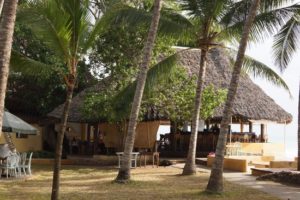
Phillip and April were ‘on holiday’ as the English love to say. Phillip was a secondary school teacher in Botswana, a country I had been to a few weeks earlier. In fact, I had been to Maun where they lived and we talked about my camping out on the banks of the Thalamakana River.
Phillip, I was to learn, had returned to Malindi and the Blue Marlin like me for sentimental reasons, but they were vastly different from mine, and he did not speak of them until April said goodnight and took the girls off to bed and he came over and sat beside me at the bar. The Indian Ocean was just fifty yards away across the sandy beach. We could see the whitecaps sparkling in the moonlight. It was March and warm and the Little Rains were over so we moved from the bar out to chairs on the sand and continued to talk about the game parks of Botswana, to trips we had taken through Kenya, Uganda and Tanzania
Phillip mentioned that his parents had been teachers, too, in Arusha, Tanzania when he was a university student at Oxford. He told me how he came out on holidays from England to visit his family, and also to spend his summers in East Africa.
I asked him then if he had ever climbed Kilimanjaro. By now we were far removed from the noise of the bar. We were alone under the vastness of a bright starry night. One cannot imagine how many stars there are in the universe until they have sat out under an African sky.
Phillip, I forgot to mention, was a few years older than me, in his early thirties, and he was handsome in that correct English upper class way, and his young wife April was stunning, blond and elegant and graceful in the manner of those women in Downton Abbey.
When I asked Phillip if he had climbed Kilimanjaro, he shook his head and fell silent. He took out a cigarette and lit it. He sipped on his Tusker beer and didn’t say anything. I thought at first I must have touched on a raw topic. And then I realized he had something to tell me, to tell a stranger he had met by chance and would never see again. He said next, in the quiet and proper calm way of the English, that he knew someone once who had been killed on Kilimanjaro.
And this is the story he told me that long ago night on the beach of the Blue Marlin Hotel in Malindi, Kenya under an African sky.
*****
Phillip was nineteen years old the summer he went to Arusha, he said, picking up his story. He was “down from Oxford and out in Africa” for the long holiday and to see his parents. He had spent most of his early years away at school, flying back and forth with siblings to visit their parents in Africa.
In Arusha his father was the Headmaster of a girl’s upper school. His mother was the school nurse, among other duties. And it was in Arusha that he met Gina, the young wife of the sports instructor at the school. His name was Arthur and he was, Phillip said, “a fine bloke really, just a bit thick.”
Arthur was active and outgoing, a warm and friendly person. “One of those ‘life of the party’ types that I couldn’t stand at the time. I was a bit of snob, thinking of myself a scholar what with reading history at Oxford.” Arthur, Phillip recalled, was “always kicking around a football and looking for someone to play a game of tennis with on the grass courts of the secondary school.”
Gina, however, was different. She was twenty-six or seven, older by a few years than her husband, older by almost a decade than Phillip. She was much more mature in ways that Arthur would never be. She was a woman, Phillip said, “who watched and waited.”
From the very first Phillip was smitten with Gina, from the very first sight of her on the lawns of his parents’ home. It was at this Sunday afternoon end-of-school party for the faculty and staff where he was pranced about and introduced to all the overseas staff. It was an afternoon for women, he said, to dress “to the nines,” but it was also sad because the women’s clothes were out of date and style. They had come to Africa on overseas assignments and time and fashion had passed them by, living as they were in this outpost. The women stood around in flowered dresses and big hats, like church ladies, all white and pasty as the African houseboys moved among them carrying trays of food and drinks. They were sad and dull and old. All but Gina.
Gina was dark and Mediterranean. She was also quiet and shy “with black olive eyes.” When she was introduced by his mother, “Oh, Gina, dear, I want you to meet my son; he’s just out from university.” Gina stared at him without speaking. Later she would confess that she had been mesmerized by him, that she couldn’t take her eyes off him. That was the word she used, ‘mesmerized,’ Phillip said, “and I’ve never forgotten that, of course, and who would forget having this dark haired, dark eyed beauty say they were mesmerized by you, and you only a lad yourself.”
Phillip broke off his story then and stood abruptly and asked if I wanted another round. He was buying. I noticed that with the telling of his tale, he had become more outgoing, expansive. Of course, it also meant that he had had too much to drink. When he returned with my lager, I saw he had switched drinks and had a brandy and soda in his fist.
He never left Gina’s side all that Sunday afternoon, he recounted, nor did she to want to leave him, it appeared. He was full of news and stories and gossip from London. She was from London, she told him, born there, but her parents were Italian. Her father was a “green grocer” and she was working at a shop girl in Harrods when she met her future husband. Arthur was just out of technical college and he swept her off her feet by saying he would take her to Africa. She would do anything to get away from Harrods and England and her family, and when she stepped off the plane in Dar, she fell in love with Africa at the first breath.
For the next several days after meeting at the faculty party, Phillip and Gina were inseparable, meeting up by chance and design at shops and bars in town. His ‘Mum,’ was concerned from the very first at the sudden intenseness of his interest in Gina. She had seen them at her party, standing alone under the giant Baobabs tree in the back lawn that whole of the African afternoon.
He was endlessly curious about Gina, peppering his mother with questions. Of course, his mother was aware of how unhappy Gina was in Arusha, and only in the second year of her marriage. Gina did not have a proper job, or children to care for, and few interests that might blend her into the English community. She did not play sports. She did not play cards. She was only happy, she told him, when she was alone and reading. “She read all of Jane Austen,” Phillip said, “during her first Rainy Season in Tanzania.”
He knew other faculty wives were aware of his interest in Gina for they teased him. It was all “quite charming really.” But for the most part, the wives and husbands were packing up the children, heading back to England, as they put it, “for a bit of civilization.” The town was clearing out of the Brits. Arthur and Gina were headed home themselves.
Much of their behavior “slid under the radar, so to speak,” not that there was ‘anything’ to their behavior. How harmless are intense personal conversations, discussions of literature, talk of shops and streets and childhoods in London? They were like other young people who did not have time enough in the day to tell each other what they thought or knew or felt.
There was nothing physical at all about the relationship, but there was physical attraction. They also found in each other the warmth they didn’t have at home. He was estranged from his family as a headstrong teenager, having grown up apart from them all through his adolescence, and she was not in love with her husband, nor did he really love her. “He married me,” Gina summed up once, ‘because he was afraid to go to Africa alone.”
And then one afternoon when Gina and Phillip were at the English club having a late lunch on the quiet cool and empty terrace, talking and talking about nothing at all, Arthur found them and rushed up in great haste and excitement and said “straight away to me” Phillip said, “that he was planning a trip up Kilimanjaro and did I want to go with him and the lads?”
Phillip had come out to Africa that summer with plans to climb Kilimanjaro. Here was his chance. Now Arthur was making arrangements. It would take two weeks, Arthur said, seven days up and two days down, another couple of days to go from Arusha to the base, and back home again. And it was really nothing much than a long walk through four ecosystems, going from the forest zone, to the heather zone, then alpine desert and finally the ice cap. In the late fifties there weren’t wonderful organized tours that are in place today where small armies of Tanzanians are employed as porters to carry chairs, tents, water, sleeping bags, and, of course, chemical toilets to reach the 19,340 summit of Kilimanjaro.
Arthur was rushing to organize the trip. He told Phillip to think it over, that he would be leaving in a day or two. He then planted a hasty kiss on Gina’s cheek. He was off, like a schoolboy free from class.
On the terrace of the English club they sat in silence for a few minutes in the wake of Arthur’s swift arrival and departure. At first, Phillip thought Gina might be feeling guilty that her husband had found her having a quiet lunch with another man, but then Gina turned to him and said with some urgency, “Don’t go and climb Kilimanjaro. Don’t leave me.”
Around 750,000 years ago, give or take a few centuries, an apocalyptic explosion along one of East Africa’s many fault lines, vomited up lava and fire for thousands of years, giving birth to the first of Kilimanjaro three separate but closely aligned peaks. Shira, the mountain’s first volcanic cone, eventually collapsed. Mawenzi arose soon after, and then went dormant. Forty thousand years later came the last and most famous cone, Kibo.
Kibo holds the summit and its famed and imperiled snows. The first non-Africans to see Kilimanjaro were most likely Arabs who traveled the continent’s caravan route in the sixth century C.E. However, Ptolemy wrote of a ’snow mountain’ around 100 C.E. The next known reference to Kilimanjaro came from an Arab geographer and Chinese writer who, at the turn of the 15th century, wrote of a ‘great mountain’ west of Zanzibar. In the early 16th century, a Portuguese geographer noted the existence of an “Ethiopian Mount Olympus.” No one in the West was aware that a “giant, snow-crowned mountain existed so close to the equator until 1848.
If one follows the history of Kilimanjaro [even from a distance] you know that the first known ascent was in 1889 by Hans Meyer, who, along with Ludwig Purtscheller, predicted that all of the mountain’s ice would disappear within three decades.
In 2001, the United Nations Intergovernmental Panel on Climate Change predicted that Kilimanjaro ice cap would be gone by 2020. This latter prediction has proved more accurate than the first. A third of the ice has disappeared since 1990. Meyer, however, was not entirely wrong; more than 80 percent of the glaciers have melted since Meyer’s time, and it is thought that as recently as the 15th century the snows of Kilimanjaro began at the upper edge of what is now the forest zone.
Global warming has a way of killing people on Kilimanjaro. In January 2006, at the Western Breach while approaching what is called ‘Kibo’s Arrow Glacier, three Americans were killed by a rockslide estimated to have been traveling at more than 125 feet per second. The cause of the slide was linked to Kibo’s receding ice, which causes rocks previously frozen to the mountain’s face to loosen and slip. The Western Breach route to the summit, once one of the most popular, has since been closed and may never re-open.
In the summer of 1958 Gina’ husband and his “boys” had no ‘technical skill’ and little equipment when they went for a long walk up Kilimanjaro, but as the Brits in Arusha would learn people die from other causes on the mountain, not just heart attacks or AMS. Phillip, however, would not die on Kilimanjaro. On the terrace of the British Club he turned to Gina and said he wouldn’t leave her.
Africa has always been known for adventure and romance and when the two clash, as they always do, there are many broken lives and hardships and stories that linger long after the couples leave the continent and become the legends passed on from one generation to the next.
When Arthur left for Kilimanjaro, Phillip did not begin an affair with Gina, he told me immediately. [Knowing that was what I was thinking.] They continued the intense friendship as Gina prepared to leave Africa on home leave once her husband returned. Phillip said that on days when he could see the crest of Kilimanjaro he would pause and wonder where Arthur might be on his long climb. This was years before cell phones, or even the well-organized climbs. It was years before an Italian, in 2001, reached the summit and descended in 8 hours and 30 minutes. In 2004, a Tanzanian would beat that time by three minutes. Both of these men ran the entire way.
Several days passed without any word of any kind about Phillip’s climb and then a district police officer arrived at the school to speak to Phillip’s father. There has been an accident. A European had been killed on the ice cap.
Phillip and I were still sitting on the warm sand of the Blue Malindi Hotel beach. Behind us a party of Germans was going strong. It was actually early in Kenya, not yet ten o’clock. I had finished off my beer but didn’t interrupt Phillip and his story by going for another Tusker. I let him continue to talk in his quiet deliberate BBC voice that kept 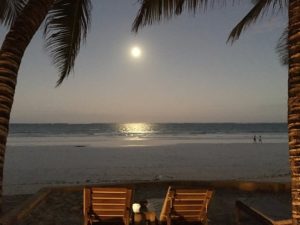 suggesting he was saving the important details of this tale for the very end. He was in no rush to reach a conclusion. It was actually so quiet that we could hear the lapping of the water beyond the lights of the hotel. I had questions, but I was nervous about asking them. I didn’t want to interrupt the natural flow of his narrative. It was such a vivid story I could not tell if he had told it before, many times, so as to have made it dramatic, or that it was a story he had told himself over and over until he had perfected it. Was it a story where he was still searching for a happy ending?
suggesting he was saving the important details of this tale for the very end. He was in no rush to reach a conclusion. It was actually so quiet that we could hear the lapping of the water beyond the lights of the hotel. I had questions, but I was nervous about asking them. I didn’t want to interrupt the natural flow of his narrative. It was such a vivid story I could not tell if he had told it before, many times, so as to have made it dramatic, or that it was a story he had told himself over and over until he had perfected it. Was it a story where he was still searching for a happy ending?
The police official told his father that one of the Tanzanian porters had come running down from the mountains to say Arthur was dead. And it was Phillip’s father who told Gina. He told her, Phillip said, while the two of them–Phillip and Gina–were sitting in the back yard of the faculty staff housing.
His father and mother and the English colonial officer came around the side of the staff quarters. As soon as he saw his parents and the uniformed British officer, he knew, Phillip said. Arthur was dead on Kilimanjaro.
That afternoon on the lawn of the girls’ school compound Gina was not told everything that had happened on the mountain. Phillip would only hear many of the details himself after he returned to Arusha from Malindi.
On that August afternoon, all that was really known was Arthur and the “boys” were within a day’s walk to the summit; they were higher than the legendary leopard of Hemingway’s famous short story, camped for the night before the next day’s final assault on the crest.
The boys were really young men from Arusha, several Tanzanians who played pickup games of football with Arthur, the son of an Indian shopkeeper home from Dar on holiday, and a Maryknoll missionary priest assigned to the nearby boys’ secondary school. They had employed several porters and guides, those who found work climbing Kilimanjaro in the days before trekking up the mountain became one of those feats people from around the world were to tell themselves they had to do before they died. There weren’t many Europeans climbing the mountain.
It was an accident, the British colonial police told Gina. It seems Arthur had gotten up to go to the bathroom. [This was years before they had those fancy portable chem toilets that reeked of bleach and were lugged up the mountain by porters for climbers’ convenience, serving the 30,000 yearly trekkers and keeping Kilimanjaro waste free.]
Something had gone wrong on the mountain. Arthur had missed a turn and took a tumble in the dark night. It had been raining for hours. Visible was poor, footing was poor. He was weak from the climb, suffering from exhaustion. There were a hundred such guesses at how he might have died.
At the secondary school Gina went hysterical. Here she was in the middle of Africa, in the midst of people who she didn’t really know or accept her, this Italian London shop girl in the class conscience English system. Arthur had been her protector, shielding her from the rigid barriers of the English class system that lived in the colonial world and now he was dead.
Was it really an accident? Had Arthur stepped off to his death, tumbled from a ridge several hundred feet into the icy cavern simply as a way to put an end to his life, knowing his wife was leaving him when they returned home, since she had already told him. This she would admit to Phillip later on the beach of Malindi. It was over this hasty marriage of theirs.
The secret thought that swept through her mind on hearing the news of her husband’s death soon was whispered by other Brits of Arusha. Arthur, after all, had been such a happy chap. Who knew? There was no inquest, no cause to suspect anything else but a horrible accident. The priest gave the man last rites on the mountainside. He was brought back to his burial in the back of a police lorry. There was no hope of taking the body to England. He was buried in the cemetery of the small colonial church.
In the whirl of those days, Gina’s life was taken over by others. Phillip and his father accompanied her from one government office to the next, death papers were signed and she suffered silently through mumbled words of sympathy by every sort of official. An Anglican service was held in the small colonial church. The eulogy was given by the Maryknoll priest who had been on the mountain with Arthur. The casket was carried by the Tanzanian ‘boys’ and later lunch was served in the gardens of Philip’s family home. No one had the proper clothes, Phillip said. They wore their best dresses, wore suits and white ties; it was like a formal reception when someone important came out from Dar on an official visit.
During this intense week, Gina and Phillip were drawn even closer by the tragedy. As bizarre as that was, he found he could follow her unspoken wishes, was connected to her psyche. “It was quite extraordinary. It was almost as if I was inside her head. I have never again been that close to a person, not even my wife. I could understand Gina’s thoughts; she could read mine.”
There were endless details of shipping Arthur’s belongings back to England, of Gina packing up, too, and leaving Africa. At some point the women of the school decided Gina must get away for a few days. She needed to go to the coast and rest before leaving Africa.
Phillip was selected as the only one to accompany her to Mombasa where she would get a ship for home. It was decided they should go a few days early, before the ship was due to leave. One of the teachers had a connection with a family hotel in Malindi, up the coast from Mombasa. A few days in the sun would be best for Gina, everyone agreed. She would then take a ship home as so many other East African colonialists had been doing since before World War I.
And so they went to Malindi and the Blue Marlin, a small family hotel on the waters of the Indian Ocean, and where they would be alone and together.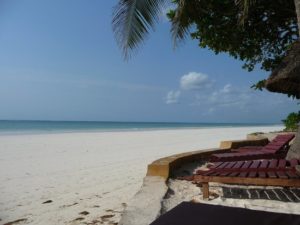
Phillip and Gina arrived in Malindi together but not as a couple. It was crowded in the hotel and rooms were scarce, but because of the connection made by the teacher in Arusha word had reached the Blue Marlin about Arthur and Kilimanjaro. Gina was given the honeymoon suite that was isolated from the other rooms, overlooked the Indian Ocean, and just yards from the water. Phillip was given a small room rented by hikers, and without hotel amenities, though breakfast tea was left on his doorstep early each morning.
Gina and Phillip stayed in the Blue Marlin for five days. On the third night they made love for the first time. “It kept coming at us,” Phillip explained to me on the beach that winter of ‘69, eleven years after he had first arrived in Malindi with Gina. “It was like an approaching storm,” he explained, in the dramatic way he had of telling me his tale. “We could feel it on the horizon. A dark massing of clouds which were unavoidable. We kept waiting, all tense about what we knew was inevitable. Finally, it swept over us as the rains do in East Africa.
“It was a drug. We could not get enough of each other. It was magically and intoxicating and sad. Gina wept in my arms after we had sex. We never left her room. We had meals delivered to us and never went to eat in the dining room.”
The British owner, Phillip would later learn, was furious at their behavior. It was the owner’s wife who made sure they were not bothered, understanding Gina’s state of mind.
Phillip and Gina made grand plans of a life together, of returning to England where he would finish his schooling and she would find work. They would get married. They would live happily ever after.
Phillip stopped talking. He had fished out a cigarette and was staring at the sea, seeing nothing in the dark night. I found myself concentrating on the rhythm of the waves and half afraid that someone–April perhaps, returning from putting the children to bed–would interrupt Phillip before he finished his tale. I couldn’t imagine myself going up to this stranger the next morning at breakfast and asking, “Say, buddy, what happened with you and Gina?” It was now or never.
“She left me on the morning of our last day we were here,” Phillip went on quickly, now summing up. “We had plans to return to Mombasa in the early afternoon. The ship wasn’t scheduled to leave until evening. Gina sent me into town to buy some items for the trip. It was her ruse to escape. The owner’s wife had arranged for a car to drive Gina to Mombasa. When I returned from the village there was a long letter saying all the things, I guess, one says at such a time. She had left it on the bed. The letter was written on Blue Marlin stationary.”
He went on to say how she wrote that she couldn’t do this to him, that it was all impossible. She was too old for him. She told him over and over how much she loved him, and that she would never forget how he saved her life. She begged him not to follow her to Mombasa.
“I didn’t follow her,” Phillip told me. “As upset and crazed as I was I also knew at some place in my subconscious that she was right. We had no future away from Africa. Africa was our paradise, so when I said I knew someone who had died on Kilimanjaro, I meant Arthur, of course, but also I meant what had happened to me here at the Blue Marlin. I died here, too, when I was a boy.”
He stopped again. I looked up and saw April was returning. She was striding through the hotel, a beautiful woman  crossing the lobby, lit with lights. She was coming to us like the rising of the sun and Phillip said one more thing, and that was the last thing he said about Gina.
crossing the lobby, lit with lights. She was coming to us like the rising of the sun and Phillip said one more thing, and that was the last thing he said about Gina.
“Whenever I’m back in London on home leave, I go into a Harrods and wander the floors looking at the shop girls behind those endless counters. I half hope and half fear I’ll see Gina. It is a fantasy I have written and rewritten in my mind thousands of time. I have never seen her again, but that daydream, out here in the Africa bush, enchants my life.”
With that, he stood and welcomed April and asked if she would care for a drink. Then he offered his wife his beach chair and turning to me, smiled and said, “May I get you a pint, Yank?”
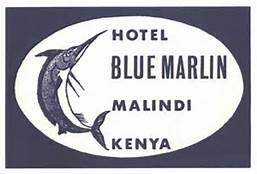
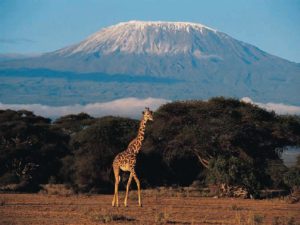
Thanks, John, for this remembrance, which probably means a lot for those earliest Africa PCVs who arrived when the TriColor and the Union Jack were still flying. And those whom we PCVs met were both indigenous tribal Africans, our Peers, teaching school, or in Government jobs, OR the variety of European colonials who were very much a presence at the time. WHO exactly should a newly-arrived PCV relate to ? Relate to some, and ignore others ?
I still remember, so poignantly, when I was leaving Nyasaland Protectorate, which had become independent as Malawi. A group of British expats whom I had worked with at the Malawi Geological Survey, had a going-away party for me, at the expat’s GymKana Club. I had to give a speech, which wasn’t exactly Churchillian. Then, a Leftenant from the First Battalion, King’s African Rifles (now the new Malawian Rifles, the national army), said, “I have something I want John to take with him, and to keep on his hat brim, when he returns to America. It was the silver emblem of the original “1-KAR”, or First Battalion, King’s African Rifles. Knowing how significant this was to the speaker, everybody cheered, and raised their glasses.
It was only a couple years later, back home, and in graduate school, after having solicited job recommendations from those I knew, that the lady at the university read a few sentences from the referrals from some of these same people. I remember one in particular: “At a time of great uncertainty, John was an inspiration to us all, and a connexion to the future.” How does one ever match a sentiment like that ? At the time, in the waning days of Colonial Africa, I had tried my best to relate to everyone I met there, each in his or her own sensibility. Nobody in the Peace Corps had prepared me for anything like this.
I still remember, on that memorable day in 1964, at the sports stadium in Blantyre, after dutiful speeches by then Prince Charles, and Prince Phillip, representing the United Kingdom, the Union Jack was slowly lowered. The new Malawi Army stood at attention. Dancers out on the soccer field came to attention. Policemen from the Nyasaland BSA Police (that’s British South Africa Police), in the stands, with their distinctive flat-topped helmets, came to attention. Then, half way down the staff, the Stadium lights were darkened, and the flag completed it’s descent in darkness. You could hear a pin drop, it was so quiet. THEN, the stadium lights suddenly came on again, and the NEW Malawi national flag was rising to the top of the staff. Fireworks shot into the air. Some people were cheering, some were weeping, some terrified by the fireworks, others simply not knowing what to think.
With Independence, there was a lot of uncertainty. in one village the BSA Police had found a man digging graves near his thatched hut. He confidently explained that after independence, there would be a reckoning. The BSA Police explained that this wasn’t what it meant, and with their Enfield rifles, stayed until all the empty graves were filled back in.
What can anyone ever trade for memories like these ?? THIS was the world of the earliest Peace Corps in Africa.
John, wonderful story…well told. Thank you. John
John the Phillip Gina story is riveting. It was told in such a way that it was difficult to let go. I reread it several
times. It expresses ecstasy, sorrow and a tragedy that lived with Philips all his life.
Samuel Manna
It’s a beautiful story, multi-dimensional. It’s a love-in-Africa story, and as Africa as a continent and as a unique environment is enveloping, it brings people together, as was the case with Phillip and Gina. Phillip’s determination that “What happens in Africa stays in Africa” permits him to move on. It’s also an adventure story. Arthur’s not reaching the Kilimanjaro summit is reminder of how many don’t make it to the top, often due to inadequate acclimation to the increasingly airless heights. His falling to his death by misstep the night before the final climb reminded me of that pitch darkness at midnight when the final ascent begins. The story is riveting and very real.
John’s story brought to mind my K-climb. I had pulled into Arusha, the nearest town, at a time when all the guides were occupied. I asked around and found a teenage boy to escort me up the mountain. He probably played hooky from school; I didn’t ask. I remember–as John’s story describes–that dark and desolate midnight with zero visibility, even with the stars, when we started on the final climb to reach the summit for sunrise. It was six days up, but we made it down in a single day. I think the boy missed his family and wanted to get home.